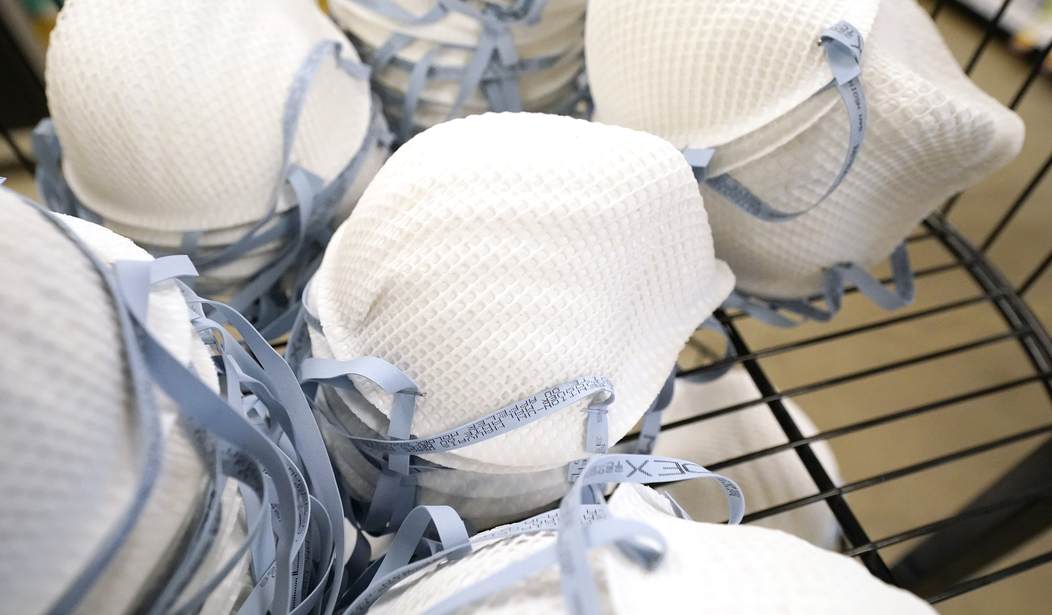After questioning the value of general mask wearing early in the COVID-19 pandemic, the Centers for Disease Control and Prevention decided the practice was so demonstrably effective that it should be legally mandated even for 2-year-olds. A new review of the evidence suggests the CDC had it right the first time.
That review, published by the Cochrane Library, an authoritative collection of scientific databases, analyzed 18 randomized controlled trials that aimed to measure the impact of surgical masks or N95 respirators on the transmission of respiratory viruses. It found that wearing a mask in public places "probably makes little or no difference" in the number of infections.
These findings go to the heart of the case for mask mandates, a policy that generated much resentment and acrimony during the pandemic. They also show that the CDC, which has repeatedly exaggerated the evidence in favor of masks, cannot be trusted as a source of public health information.
In September 2020, then-CDC Director Robert Redfield described masks as "the most important, powerful public health tool we have." He claimed masks provided more protection against COVID-19 than vaccines would.
"The evidence is clear," Redfield's successor, Rochelle Walensky, insisted in November 2021, when she averred that wearing a mask "reduc(es) your chance of infection by more than 80%." Three months later, the CDC claimed a study it published had shown that "wearing a mask lowered the odds of testing positive" by as much as 83%.
These statements were based on two sources of evidence with widely recognized drawbacks: laboratory experiments in stylized conditions and observational studies that do not fully account for variables that affect virus transmission. RCTs are designed to avoid those problems by comparing disease rates among subjects randomly assigned to wear masks in real-life situations with disease rates in a control group.
Recommended
If masks had the dramatic effect that the CDC claimed, you would expect to see evidence of that in RCTs. But the Cochrane review found essentially no relationship between mask wearing and disease rates, whether measured by reported symptoms or by laboratory tests.
When it comes to symptoms consistent with COVID-19 or influenza, the authors reported, "wearing masks in the community probably makes little or no difference." They reached the same conclusion regarding laboratory-confirmed cases.
Two RCTs were conducted during the pandemic, one in Denmark and one in Bangladesh. The first found no protective effect, while the second found that symptoms consistent with COVID-19 were about 11% less common in the masked group.
The latter finding was far less impressive than the results from the observational study that the CDC touted in February 2022. In that study, the CDC reported, surgical masks similar to the ones used in the Bangladesh RCT reduced the risk of infection by 66%. Even cloth masks, which the CDC has conceded are the least effective kind, supposedly reduced infections by 56%.
That gloss obscured grave methodological problems with the CDC-promoted study, including sample bias, recall bias and the failure to consider "other preventive behaviors." As the Cochrane review notes, the Bangladesh study also suffered from several weaknesses, including "baseline imbalance, subjective outcome assessment and incomplete follow-up across the groups."
In any case, including the Bangladesh RCT, which accounted for a large share of the data in the Cochrane meta-analysis, it did not change the overall results, which indicated "little or no effect of mask use." And contrary to the expectation that N95 respirators would prove superior to surgical masks, the review found that the existing evidence "demonstrates no differences in clinical effectiveness."
The authors suggest several possible explanations for these results, including "poor study design," inconsistent or improper mask use, "self?contamination of the mask by hands," "saturation of masks with saliva" and increased risk-taking based on "an exaggerated sense of security." But one thing is clear: Instead of following the science on masks, the CDC distorted it to support a predetermined conclusion.

























Join the conversation as a VIP Member